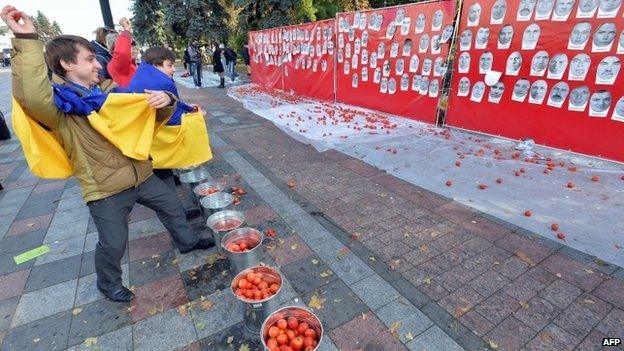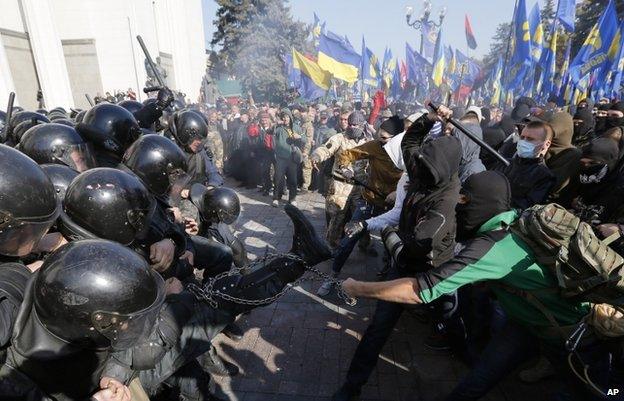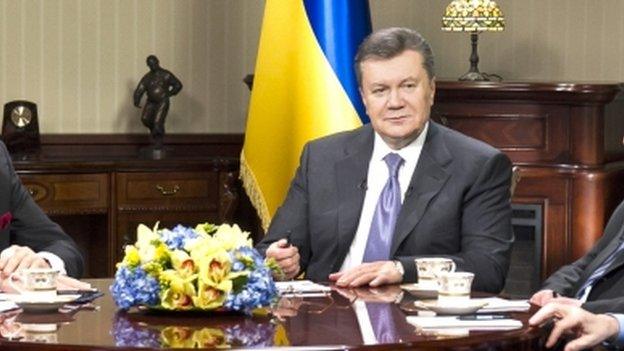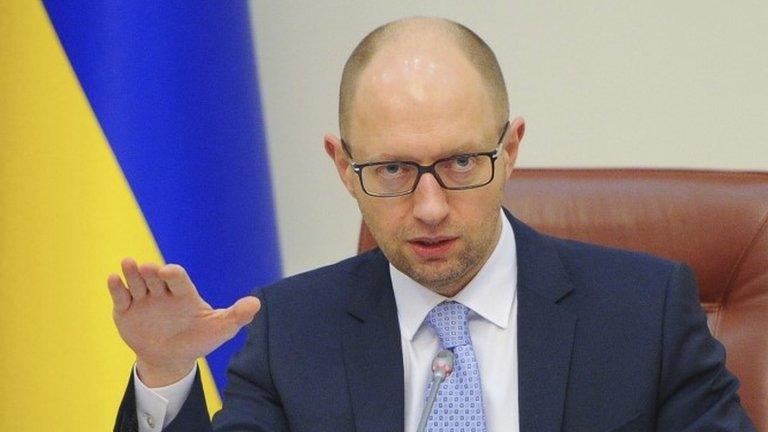Ukraine's politicians face mob attacks
- Published

Ukraine is seeing eyecatching anti-corruption protests
Over the past few weeks, Ukrainian political activists have carried out a series of sensational actions, seizing politicians and local officials and throwing them into big bins.
The activists, many from far-right groups, accuse the politicians of various offences, and call their actions "trash bucket challenges" - echoing the "ice bucket challenges" that were recently an internet viral hit. They even have a hashtag: #trashbucketchallenge.
The Ukrainian version, also accompanied by video footage, has been eyecatching - and often brutal.
In one, Viktor Pylypyshyn, external, a politician trying to register as a candidate for the 26 October parliamentary elections, was tossed into a large waste bin, or dumpster, outside Kiev's Central Electoral Commission. He was a member of former President Viktor Yanukovych's Party of Regions.
The footage shows Mr Pylypyshyn sitting forlornly on a pile of garbage, covered in red paint, as activists continue to hurl rubbish and curse him.
"Bitch, you think that the Maidan is over? It's just begun," one man shouts, off-camera, referring to the February "Euromaidan" revolution, which drove President Yanukovych from power and delivered a new pro-Western government in his place.
The "binning" supporters say these actions are necessary because, eight months after the country's revolution, the government has done nothing significant to tackle corruption.
Outrage has not ebbed over revelations of immense wealth and conspicuous consumption among former President Yanukovych's inner circle - including an opulent estate owned by Mr Yanukovych himself, and a massive collection of gold bars belonging to one of his ministers.

Far-right supporters clashed with police outside parliament last week as tensions rose in Kiev
Fragile economy
All this is unfolding against a backdrop of rising economic discontent. The fighting in the east has shut down much of the steel and mining industry, which is at the heart of Ukraine's economy.
There are also fears of a frigid, gas-less winter, owing to a lengthy dispute over prices with Moscow.
This year, the country's economy may shrink by 10%. A feeling of malaise is palpable: Kiev is dotted with empty shop fronts, and political protests are constant.
The trashings have spread across the country. Many of these look like pre-election campaign stunts - video cameras and journalists always seem to be close by and in full supply. But they have definitely touched a nerve. The actual number of incidents is unknown, but it appears to be growing.
Party deputy Vitaly Zhuravsky says he is recovering after being held down in a bin outside parliament on Tuesday
"People are tired of waiting; people are disappointed," said Boryslav Bereza, a member of the ultra-nationalist Right Sector, which has carried out a number of the trashings.
"And when the government is unable to take the law into its hands, then the street takes matters into its hands."
Mr Bereza and others also call the binnings "people's lustrations". A lustration was a sacrificial cleansing ceremony in ancient Rome, but has come to refer in Eastern Europe to a vetting process to filter out former communist officials.
The country's own lustration law, now signed by the president, was passed on 16 September - the day of another trashing. Vitaliy Zhuravsky, external, a member of parliament and Yanukovych ally, was tossed into a waste bin as he was entering the legislature.
His exact offence is still unclear.
Not all the victims have been linked to the Yanukovych government, however. Police have opened investigations into a couple of the incidents, but so far no charges have been levelled.

Ukraine's lustration law - or law on the "cleansing of power"
A key demand of pro-EU demonstrators who ousted Viktor Yanukovych from power in February 2014, the law bans:
Those who served for at least one year when Viktor Yanukovych was in power (25 February 2010 - 22 February 2014)
Those who held office during protests against him (21 November 2013 - 22 February 2014)
Those who helped him "usurp power", undermined Ukraine's security, promoted separatism, ethnic discord or violated human rights
Police officers, prosecutors and judges involved in the prosecution of anti-Yanukovych demonstrators, or in the obstruction of such protests
Senior Soviet Communist Party functionaries, KGB agents and officials with more assets than their income would allow
Source: BBC Monitoring

Oleh Lyashko, the head of the Radical party, which is polling in second place ahead of Sunday's parliamentary elections, violently threw an official in the waste bin when he could not find his intended target. He said the official was "lying" and therefore deserved his abuse.
Some observers say the attacks are less about grassroots justice, or sending a message to those in power, and more about mob rule - pointing out that the February revolution was presumably about introducing "European values" to Ukraine.
They have condemned the incongruity of carrying out vigilante justice in order to strengthen the rule of law.

President Viktor Yanukovych was ousted from power in February 2014
"Europe is not some giant shopping-mall or a high-class resort, as some imagine," wrote Alyona Getmanchuk, external, the director of the Kiev-based Institute of World Policy.
"Trash is no substitute for judgement. Fists are no substitute for judgement," she added. "The real Europe ends not where the EU ends. It ends where the law ends."
The binning incidents also raise concerns over the lustration law.
Supporters say it helped sweep away the vestiges of communism and strengthen democracy in countries where it was introduced, like the Czech Republic.
Still, human rights activists say Ukraine's version is too broad.
According to the legislation's authors, more than one million people, external will be vetted.
"If all these people are dismissed, who will replace them?" asked Yevhen Zakharov of the Kharkiv Human Rights Protection Group, external.
"The country's main problem is an insufficient number of modern educated people."
Second Maidan
Mr Zakharov also said the law was passed under questionable circumstances, and that it did not provide for an independent body to oversee the process. "This is being perceived as a great victory for democracy, but in fact it's a great defeat," he wrote.
Nevertheless, as the country's economy deteriorates and anger in the country grows, many Ukrainians are speaking of a "second Maidan" if things do not change soon.
Already the political confrontations have taken an even more violent turn: Nestor Shufrych, another Yanukovych ally, was taken to hospital after a throng badly beat him as he tried to enter a building in the southern city of Odessa to hold a news conference.
Boryslav Bereza of Right Sector has called the binnings a "soft form of lynching", though he warns the real thing could be not far off.
"We have seen people thrown into bins and now they are being beaten up. It's frightening for me to think of what could come next."
- Published17 September 2014
